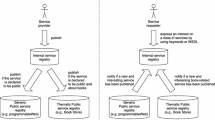Abstract
This paper presents an approach to achieve User Model (UM) interoperability exploiting Web Service technologies for syntactic interoperability, and Semantic Web languages for semantic interoperability, together with negotiation techniques based on dialogue. We propose a SOA-based framework where a central UDDI registry, enhanced with UM specific capabilities, is used to support and promote the cooperation between UM-based applications.
Preview
Unable to display preview. Download preview PDF.
Similar content being viewed by others
References
Cena, F., Aroyo, L.: A semantics-based dialogue for interoperability of user-adaptive systems in a ubiquitous environment. In: Conati, C., McCoy, K., Paliouras, G. (eds.) UM 2007. LNCS (LNAI), vol. 4511. Springer, Heidelberg (2007)
Chepegin, V., Aroyo, L., De Bra, P.: Broker-based discovery service for user models in a multi-application context. In: ICALT 2005 (July 2005)
Houben, G.J., van der Sluijs, K.: Towards a generic user model component. In: UM 2005 (2005)
Searle, J.: What is a speech act. Language and Social Context (1972)
Vassileva, J.: Distributed user modelling for universal information access. Universal Access in Human - Computer Interaction 3, 122–126 (2001)
Yimam, D., Kobsa, A.: Centralization vs. decentralization issues in internet-based knowledge management systems:experiences from expert recommender systems. In: TWIST 2000 (2000)
Author information
Authors and Affiliations
Editor information
Rights and permissions
Copyright information
© 2008 Springer-Verlag Berlin Heidelberg
About this paper
Cite this paper
Cena, F., Furnari, R. (2008). A SOA-Based Framework to Support User Model Interoperability. In: Nejdl, W., Kay, J., Pu, P., Herder, E. (eds) Adaptive Hypermedia and Adaptive Web-Based Systems. AH 2008. Lecture Notes in Computer Science, vol 5149. Springer, Berlin, Heidelberg. https://doi.org/10.1007/978-3-540-70987-9_35
Download citation
DOI: https://doi.org/10.1007/978-3-540-70987-9_35
Publisher Name: Springer, Berlin, Heidelberg
Print ISBN: 978-3-540-70984-8
Online ISBN: 978-3-540-70987-9
eBook Packages: Computer ScienceComputer Science (R0)




